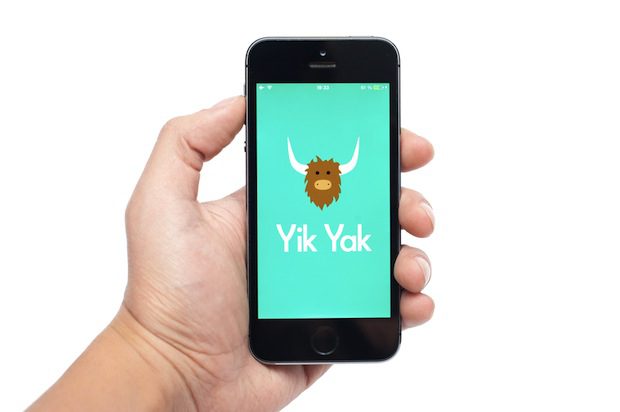Yik Yak Yuck

Cops in Missouri arrested a 19-year-old jerk for making a violent racist threat on the popular public chat service Yik Yak — which is supposed to be anonymous, but guess what, kids? It’s not! Ha ha! Elderly git that I am, I didn’t know what Yik Yak was till a New Orleans friend recently showed me how it works. Caitlyn Dewey at the Washington Post explains:
Yik Yak is essentially a public, anonymous, location-based message board: After downloading the app, you can post anything you want to nearby readers — who can then comment, up-vote or down-vote your “yak,” also anonymously.
Since it was founded by two recent college grads in 2013, the app has proven particularly popular among students, who often use it to trade the sorts of jokes and campus gossip that — in this ultra-Googleable age — they wouldn’t want to post under their real names. But it’s also posed major, repeat problems, at universities especially, when students abuse the app’s promise of anonymity.
More:
Slate’s Amanda Hess has argued, convincingly, that the app actually helps empower people who might otherwise be marginalized or ignored: certainly, there are plenty of instances in which students have used Yik Yak to spread positive messages or to draw attention to important causes.
Well, maybe. I dunno. To use Yik Yak, you have to be in the immediate geographic area covered by the service; Yik Yak is a localist phenomenon. My New Orleans friend says when he’s around the campuses of Tulane and Loyola and checks in on Yik Yak, the conversation is dominated by two things: 1) students arranging polymorphously perverse sexual encounters, and 2) students expressing their deep and abiding loneliness — that is, their inability to satisfy their desire to make a human connection.
I suspect those two things are connected in ways we don’t really want to think about.
I wonder if the college students who have been using the app to arrange sexual encounters are bothered by the fact that it’s not really anonymous? Gizmodo writes:
Yik Yak plays up the fact that you don’t have to attach your name to what you post on its virtual board. At one point, its tagline was, straight up: “No profile, no password, it’s all anonymous.”
But, you know, it’s not.
Your name doesn’t appear publicly attached to stuff you post on Yik Yak, but if you do something criminal, like threaten to kill students, the app cooperates with law enforcement. It can provide your account information, geolocation logs, and other identifying data. Yik Yak can turn everything it has over to police in cases like the Mizzou threats to help catch the shit jockeys posting bile.
Investigators have already used Yik Yak’s identifying data to catch students making threats against schools in New York, Michigan, Indiana, and Alabama.
Gizmodo explains further how you aren’t really anonymous on Yik Yak. Now, to be sure, you can be reasonably confident that no law enforcement agency is going to subpoena your Yik Yak records to find out who you went to bed with, and under what circumstances. Now, at least. I wonder, though, how long those records are kept, and if, in the future, someone at the NSA wanted dirt on someone who had risen to prominence in public life, and was seen by the government as a threat? Maybe Walter Kirn is right: “If you’re not paranoid, you’re crazy.”
Subscribe for as little as $5/mo to start commenting on Rod’s blog.